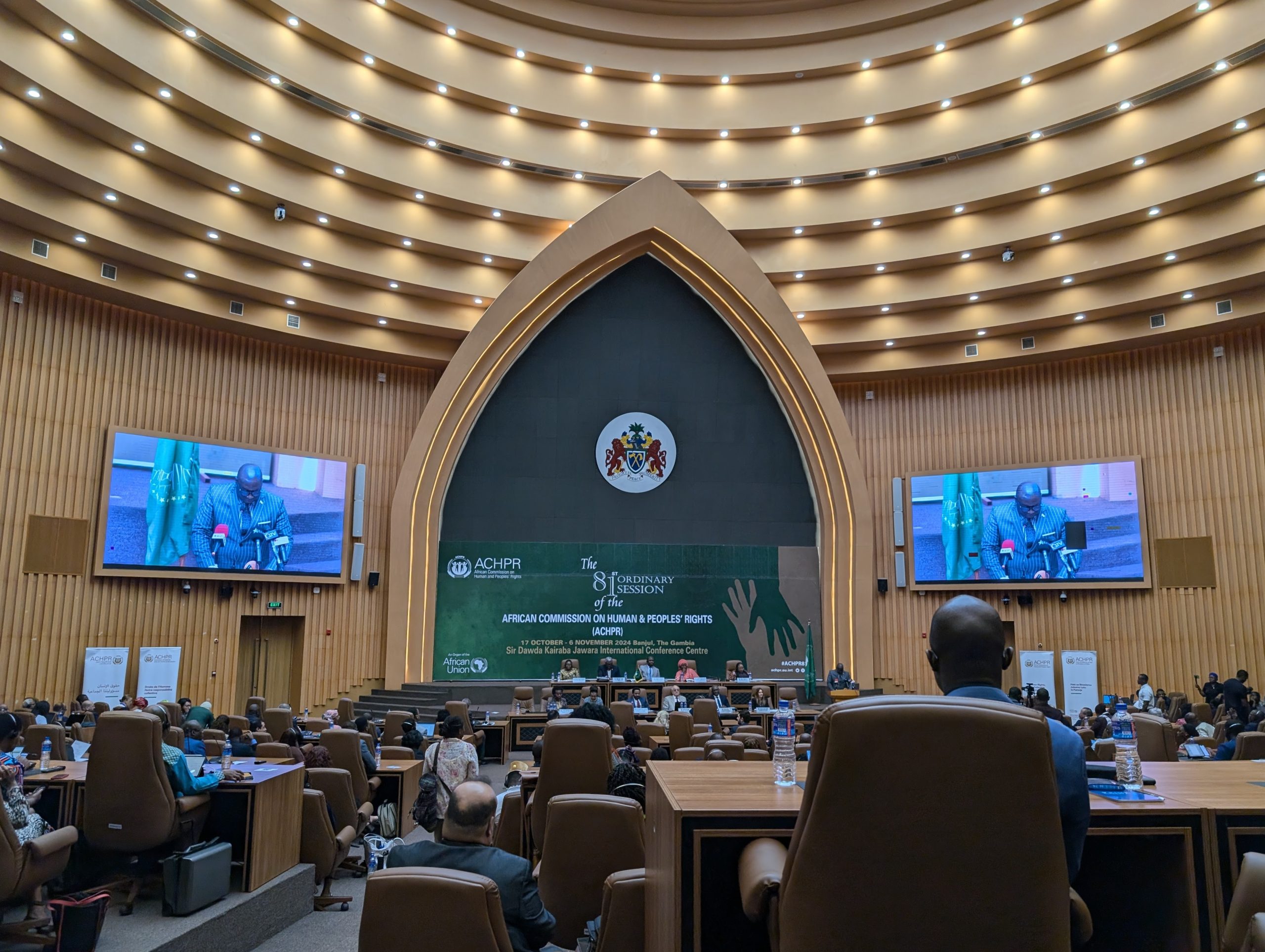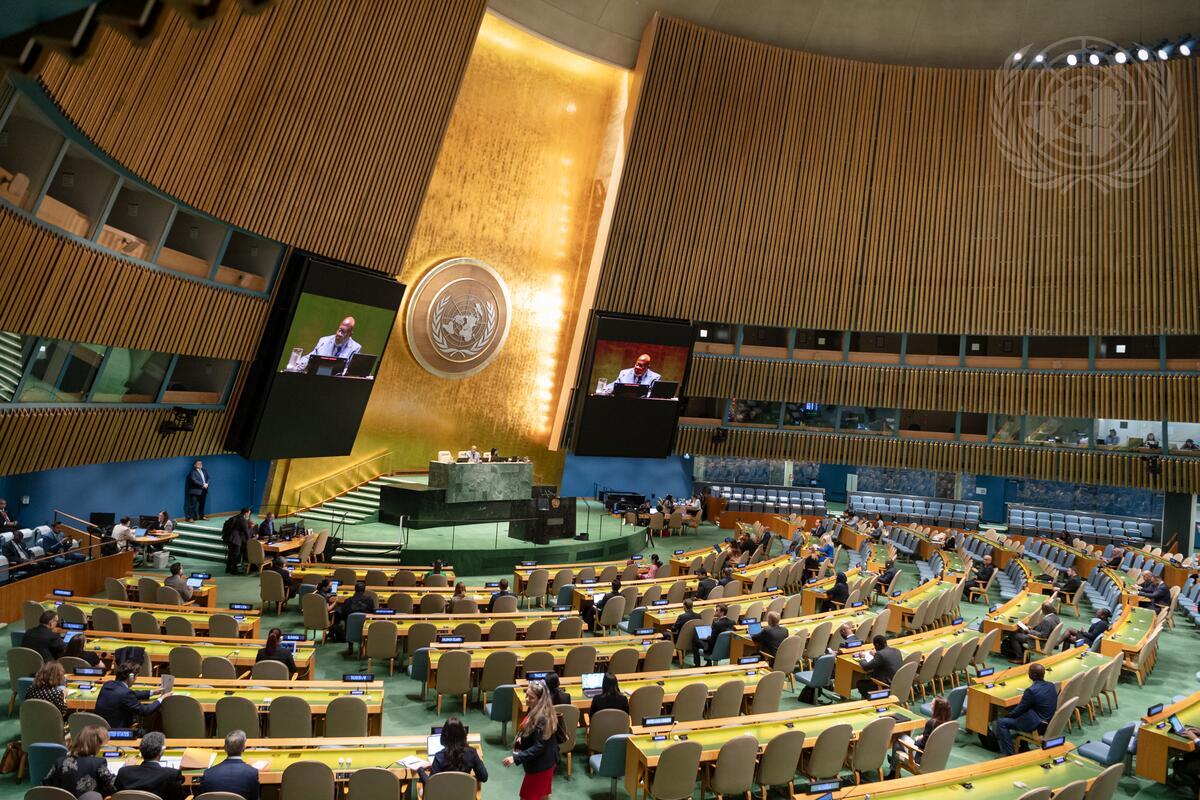The 81st session’s theme was ‘Educate an African fit for the 21st Century’. It was attended by 631 participants, including: 122 representatives of 28 State parties; 11 representatives of African Union (AU) institutions; 2 representatives of regional economic communities; 27 of international organisations; 45 representatives of national human rights institutions; 372 representatives of non-governmental organisations; 12 representatives of the press; and 40 staff members of the African Commission’s own Secretariat.
Find the session’s final communiqué here.
Ten speakers took the floor during the opening ceremony of the 81st session. This included Hannah Forster, from the African Center for Democracy and Human Rights Studies, who spoke on behalf of the NGO Forum held before the ACHPR’s session – and to which ISHR participated – and called attention to the shrinking civic space in many African countries, notably Burkina Faso, Mali, and others, owing to the threats, risks, and reprisals – extrajudicial killings, enforced disappearances, forced conscription, etc. – increasingly faced by human rights defenders.
The Chairperson of the Commission, Rémy Ngoy Lumbu, also took the floor and spoke on the threats, risks, and reprisals faced by human rights defenders, the shrinking of civic space, and the restriction of civil and political rights in Côte d’Ivoire, the DRC, Kenya, Uganda, Tunisia, and Burkina Faso. He also applauded the work of the NGO Forum, stating that ‘Africa will only get better with a strong civil society’.
Some 15 panels were organised during the session, including the Panel on the Impact of Article 59 of the African Charter on Human and Peoples’ Rights on the Communications Procedure of the African Commission. Indeed, ISHR is part of the Article 59 campaign, which aims for a progressive interpretation of article 59, in accordance with international standards, to allow for greater transparency, access to information, and participation of civil society in the proceedings of the African Commission. ISHR called for these reforms in our statement under item 3.
Two States presented their periodic reports during this session:Burkina Faso and Angola. ISHR submitted civil society reports in both instances, drawing attention to the shrinking civic space, restrictions on freedom of expression, association, assembly and the press in Angola, and cases of torture, arbitrary detentions, and forced conscription in Burkina Faso. Two other States whose periodic reports were supposed to be considered, Ethiopia and Mauritius, were instead postponed to the next ordinary session in April 2025.
The 11 Commissioners presented their intersession activities reports. Rémy Ngoy Lumbu presented his report as the Chairperson and the Special Rapporteur on Human Rights Defenders and Focal Point on Reprisals in Africa, drawing attention to the African Commission’s Guidelines on Freedom of Association and Assembly in Africa and the new tracking tool on freedom of association and assembly in Africa, developed thanks to the Special Rapporteur’s Support Group, of which ISHR is a member.
ISHR further intervened during the presentation of these reports, notably calling on the Special Rapporteur to release his report on reprisals, to which ISHR has contributed, while also highlighting to the human rights situations in Liberia, the Democratic Republic of the Congo, Sierra Leone, Angola, Côte d’Ivoire – in cooperation with our partner the Coalition ivoirienne des défenseurs des droits humains on the situation of LGBTQI+ defenders – and Uganda. On the latter, we noted the alarming rise in enforced disappearances, torture, and other persecutions against human rights defenders, especially environmental defenders, and calling for a country visit of the Special Rapporteur.
Finally, the 81st ordinary session saw the celebration of African Human Rights Day and the entry into force of the Protocol on the Rights of Older Persons in Africa. ISHR co-organised a number of side events including one on the 25th anniversary of the UN Declaration on Human Rights Defenders, which was attended by Commissioner Ngoy Lumbu and launched Declaration+25, a supplement to the original UN Declaration on human rights defenders to improve the overall normative protection of human rights defenders. ISHR also co-organised a side event on the situation in Palestine and its relevance for the African human rights system.
The Commission adopted 27 resolutions:
Special Mechanisms Resolutions
- Resolution on the Renewal of the Mandate and Reconstitution of the Committee for the Prevention of Torture in Africa and the Appointment of its Members
- Resolutions on the Renewal of the Mandate of the Special Rapporteur on Prisons, Conditions of Detention, and Policing in Africa
- Resolution on the Renewal of the Mandate of the Special Rapporteur on Freedom of Expression and Access to Information in Africa
- Resolution on the Extension of the Mandate of the Advisory Committee on Budgetary and Staff Matters (ACBSM) to include supervision of audit functions
- Resolution on the Renewal of the Mandate of the Advisory Committee on Budgetary and Personnel Matters
- Resolution on the Renewal of the Mandate of the Working Group on Communications
- Resolution on the Renewal of the Mandate of the Special Rapporteur on the Rights of Women in Africa
- Resolution on the Renewal of the Mandate of the Special Rapporteur on Human Rights Defenders and Focal Point on Reprisals in Africa
- Resolution on the Renewal of the Mandate of the Working Group on Economic, Social, and Cultural Rights in Africa
- Resolution on the Renewal of the Mandate and Reconstitution of the Working Group on Extractive Industries, the Environment, and Human Rights Violations in Africa
- Resolution on the Renewal of the Mandate of Certain Expert Members of the Working Group on Indigenous Populations/Communities and Minorities in Africa
- Resolution on the Renewal of the Mandate of the Working Group on the Death Penalty, Extrajudicial, Summary, or Arbitrary Executions, and Enforced Disappearances in Africa
- Resolution on the Renewal of the Mandate of the Support Group of the Special Rapporteur on Human Rights Defenders and Focal Point on Reprisals in Africa for the promotion and effective implementation of the Guidelines on Freedom of Association and Assembly in Africa
Country Resolutions
Thematic Resolutions
The African Commission will hold an extraordinary session from 2 to 6 December 2024 in Dakar (Senegal), the next private ordinary session will be held virtually 25 February to 11 March 2025, and information on the next public ordinary session will be announced later.




